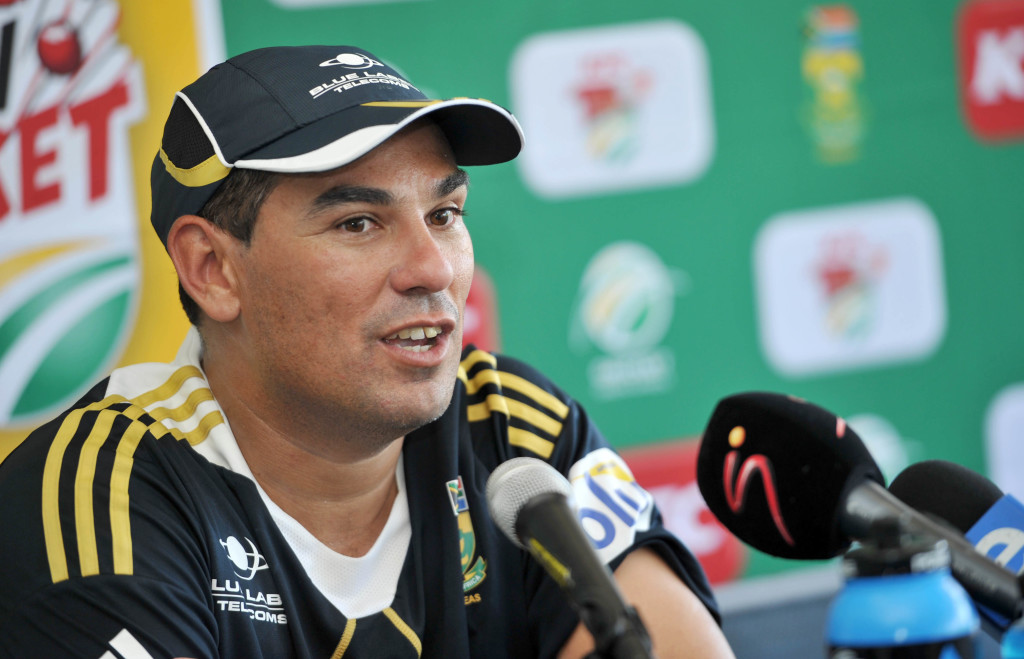South Africa have faced up to their ‘chokers’ tag in World Cups and have learned from the mistakes that previous sides have made, says coach Russell Domingo.
The business end of the tournament has arrived, and naturally the subject of South Africa’s past as supposed serial chokers in play-off games has again surfaced as they prepare to face Sri Lanka in Wednesday’s quarterfinal in Sydney.
Having never won a World Cup play-off game, South Africa will need to make history on Wednesday if they want to progress to the semifinals, something they failed to do at the previous tournament in 2011.
Since 1992, when they were knocked out in the semis in a rain-affected game against England, players and coaches have had to answer the same questions about their implosions in big games.
‘I was in matric, I was 16-years-old. There’s nothing we can do about what happened in 1992, all our energy is focused on what we need to do leading into this game,’ said the now 40-year-old Domingo at the SCG on Monday.
‘The legacy of 1992 has very little bearing on now, we want to play our game on Wednesday.’
South Africa lost in the World Cup quarter-finals in 1996 and went out on tournament net run-rate after a tie with eventual champions Australia in a thrilling semi-final in 1999.
Another tie, this time with Sri Lanka in Durban, after failing to correctly interpret the Duckworth/Lewis rule for rain-affected matches – which owed its origin to what happened to the Proteas in 1992 – meant South Africa bowed out at the initial group stage when they were the main hosts of the 2003 World Cup.
Then came a 2007 semifinal loss to Australia in the Caribbean before a quarterfinal defeat by New Zealand four years ago.
Asked about South Africa’s habit of ‘choking’ in crunch games, Domingo said: ‘It’s been part of South African cricket for quite some time, every time we get to these events it’s going to be questioned.
‘We’ve spoken about it, we’ve faced the fact that in the past we have let opportunities slip by us. Hopefully, we have learned from the mistakes that previous sides have made at events like this.
‘And by all means we want to avoid that happening to us. But at the end of the day, we just want to play good cricket if the opportunity arises. If somebody is in that stage of the game under pressure, we try to focus on things we’ve done really well and not get too caught up in the past.’
‘We know we’ve come here with a clean slate… We come here knowing that if we play to the best of our abilities, we’ve got a good chance of winning on Wednesday.’
Domingo said South Africa have a very even record against Sri Lanka and he expected a tight contest. Kumar Sangakkara has been the best batsman at the World Cup so far and has scored a hundred in his last four innings at the tournament.
‘We have some plans we’ve worked out for Sangakkara when he comes to the crease,’ said Domingo.
‘He probably has a low score around the corner. If all our focus is on Kumar, then we’re in trouble because Sri Lanka have some seriously good players. The lads are really up for peaking at this stage of the World Cup and I expect that to happen on Wednesday.’
Regarding South Africa’s best XI, Domingo said he and the selectors faced some ‘tricky’ decisions.
Quinton de Kock’s place in the side has been up for debate since the tournament started, but he is likely to keep his place in the team.
‘It’s often difficult to have everyone firing at the same time. I have a gut feeling about Quinton that he’s just around the corner from having a match-winning innings,’ said Domingo.
‘Coaching and selection is not an exact science, so you have to go with your gut feeling.’
The Proteas have again used the services of South Africa-born explorer Mike Horn in a bid to ease the pressure on their side.
‘He’s done a lot scarier things in the world than facing Dale Steyn or Morne Morkel, he’s done some extreme things,’ said Domingo.
‘He will put it all into perspective for us over the next couple of days about what pressure and fear’s like and being out of your comfort zone, because he’s been in that situation a lot of times with real-life experiences, not just facing a cricket ball.’
‘He’s been with us before and adds a lot of energy, he connects with the players, it’s great fun to have him with us.’







